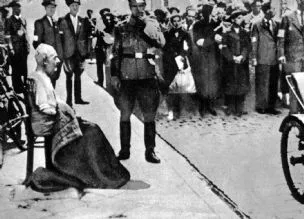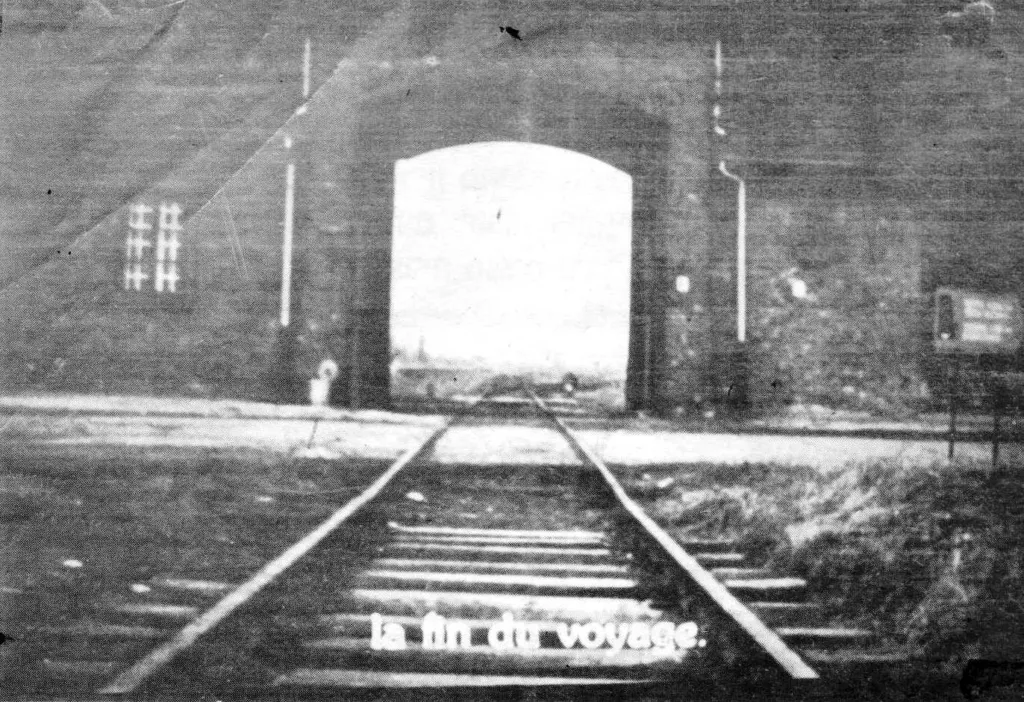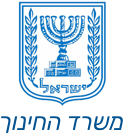By: Yaakov Rosenfeld, Ganzach Kiddush Hashem
On the eve of Yom Kippur, Menachem went up to Mount Zion, recited Mincha and the confessional prayers, and sat down in a corner near the Chamber of the Holocaust memorial to eat a pre-fast meal.
Menachem took out two slices of dry bread from his backpack, lifted them, and blessed them as is done with the two loaves of bread on Shabbat night, and then ate them in silence.
The supervisor on the mountain observed his actions and did not refrain from asking: “What is the nature of this custom?” Then Menachem related the incident that happened to him, on the night of Yom Kippur, while he was in the Treblinka death camp.

Jews in the Warsaw Ghetto, amongst them sick patients, destined for deportation to the Treblinka death camp, arranged in rows on a ghetto street
“I was one of hundreds of Jews in that cramped barrack. Together we worked hard and together we suffered; we received murderous beatings day and night.”
“Together we hungered for bread, a hunger that has no description, hunger until one’s soul left, and together we cried for our loved ones who fell. Day after day we saw the dense, silent rows, the rows of Jews who entered the gas chambers.”
“The head of the camp, Hans, always walked around with a whip in his hand, with predatory dogs following him, and in a fit of rage whipped and hit people left and right. Hans beat people for things they did and things they didn’t do, and when he gave a signal to his dogs, they would jump on a person and tear him to pieces.”
“Hans and his dogs placed the fear of death in us, the prisoners of the camp, more than the fear that the gas chambers instilled in us.”
“A few days before Yom Kippur, an idea came to Hans’s mind.”
“He decided to starve us two days before Yom Kippur.”
“We were all so hungry then. We subsisted on one plate of soup a day, and the absolute hunger imposed on us; two days before Yom Kippur was beyond our strength and many fell and died of starvation.”
“Yom Kippur fell that year, the year 5704 (1943), on the holy Shabbat, and we had already begun to fast on Thursday and Friday, and thus we entered the night of Kol Nidrei (Yom Kippur eve) starving and helpless.”
“We secretly gathered for the Yom Kippur night prayer in a side barrack. Our ‘guards’ patrolled outside to warn of any trouble that could come, and so we stood in prayer with a broken heart and choking on our tears.”
“At midnight they woke us up.”
“We thought it was time; now they were taking us to the gas chamber, but no. They announced that food is now being distributed.”

Entrance gate to the Treblinka death camp
“We quickly understood the evil ploy.”
“He starved us for two days, this evil Hans, so that we would not fast on Yom Kippur.”
“May you never know the feeling of hunger that maddens the senses,” Menachem wished and continued: “The people jumped from their bunks and quickly ran to devour the food, this to the amusement of Hans, who stood with his dogs and screamed in a loud voice: ‘Happy fasting, Jews! Happy fasting Jews!'”
Menachem sank into his memories. He remained silent for a while and then continued to tell his story.
“We were about ten people, a minyan (prayer quorum), who decided not to eat the bread.”
“We acted wisely so as not to provoke the devil, we hid the bread out of sight, and continued to fast.”
“Aharon, a Karliner chassid, a righteous man and a worshiper of G-d, heard this; even in the camp he did not cease his worship, out of love and enthusiasm, and immediately came to us like a storm wind.”
“He reprimanded us saying: ‘And doesn’t the Brisker Rebbe rule that the one who is strict about the sick on Yom Kippur, does not make the laws of Yom Kippur stricter, but eases the laws due to life preservation!'” (Another way of saying it: He who commands the sick to eat on Yom Kippur does not ease the matter of fasting, but makes it stricter in the matter of life preservation.)
“We heard his comment, but we didn’t know how to act.”
“Aharon, seeing that his words did not convince us, called us to eat with him. We set up a table in honor of Shabbat and Yom Kippur, and based on Aharon’s instruction, we carried on with the loaves of bread, as is customary on Shabbat night.”
“Aharon waved the bread which surved as our two white challahs, and blessed them with piety, and so did we.”
“In the distance we heard the wild laughter of Hans, but with Aharon’s intervention we were not afraid. His face lit up with the Grace after Meals, which he said with the reitzeh and yaaleh v’yavo prayers (additional prayers said on Shababt and holidays).”
“Suddenly, when we finished reciting Grace after Meals, we saw Aharon’s face and behold, it was not good. He started to cry and said to us: ‘It may be that I, who was given a sturdy and strong body, was not allowed to eat, but I ate so that you may eat. I knew that if I didn’t eat, you wouldn’t eat either, and that’s a danger for you! I’m asking you!’ He barely managed to say amongst his crying, ‘that I will have advocates in Heaven.'”
“Of this whole group,” Menachem finished and said, “I was the only one left alive.”
“And in memory of that Shabbat and Yom Kippur feast that we held together in Treblinka, I have a custom to eat two old, dry slices of bread on Yom Kippur eve.”
Source: Noach Zevuluni, “Not Published”







